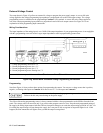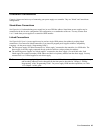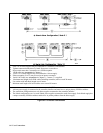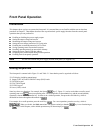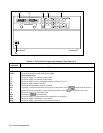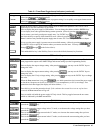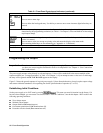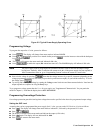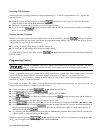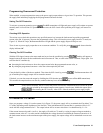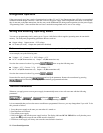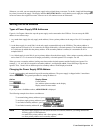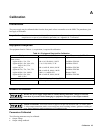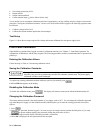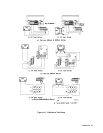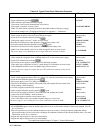
Front Panel Operation 90
Checking OVP Operation
Assuming the above operating conditions (voltage programmed to 4.5 V and OVP programmed to 4.8 V), trip the OVP
circuit as follows:
■ Gradually increase the output voltage by pressing until the OVP circuit trips. This will cause the output
voltage to drop to zero and the
Prot annunciator to go on.
■ There now is no power supply output due to an overvoltage condition.
■ To verify this, press and observe that the display indicates 0V. This shows that the protection circuit tripped
due to an overvoltage condition.
Clearing The OVP Condition
With the OVP tripped, return to the meter mode and try to clear the condition by pressing . Nothing will appear
to happen because the OV trip voltage is still below the programmed output voltage. Thus, as soon as the circuit is cleared,
it trips again. You can clear the OV condition by:
■ Lowering the output voltage below 4.8 (the OV setting), or
■ By raising the OV trip voltage above the output voltage setting.
Try either of these methods. Now when you press
, the Prot annunciator will turn off and the output voltage will
return to normal.
Programming Current
ENERGY HAZARD. Some power supplies (Series 668xA) can provide more than 240 VA at more
than 2 V. If the output connections touch, severe arcing may occur resulting in burns, ignition or
welding of parts.
You may program the power supply current without a load, but must have a load in order to draw output current. These tests
assume you have the load connected in accordance with the information in “Chapter 4 - User Connections and
Considerations”. If you do not have a load on the power supply, you may connect a short across the output terminals as
described in “Chapter 3 - Turn-on Checkout”.
The example will program a low current. (You may later increase the output current to the levels you will expect to use.) To
program the output current to 1.3 amperes, proceed as follows:
■ Disable the output by pressing . The Dis annunciator will turn on.
■ Program the voltage by pressing .
■ Press . The display will change from meter mode to indicate AMPS.
■ Press . If you discover a mistake before pressing erase the incorrect value with the backspace
key
.
■ The display will return to the meter mode and indicate up to 0 . 000.
■ Press to enable the output. Dis will turn off and the display will indicate VOLTS 5 . 000 AMPS 1. 300.
■ Now increase the current by pressing . Note that the current increases by a specific increment (depending on
the current programming resolution) each time you press the key and increases rapidly as you hold down the key. To
decrease the current, press
.
■ Try increasing and decreasing the current by rotating the Current knob clockwise and counterclockwise. Note how the
output responds as compared to using the
Entry keys.
Disable the output by pressing
. The Dis annunciator will turn on. Now try to program a current greater than
the I
MAX
for your supply. Note that the display shows OUT OF RANGE.



